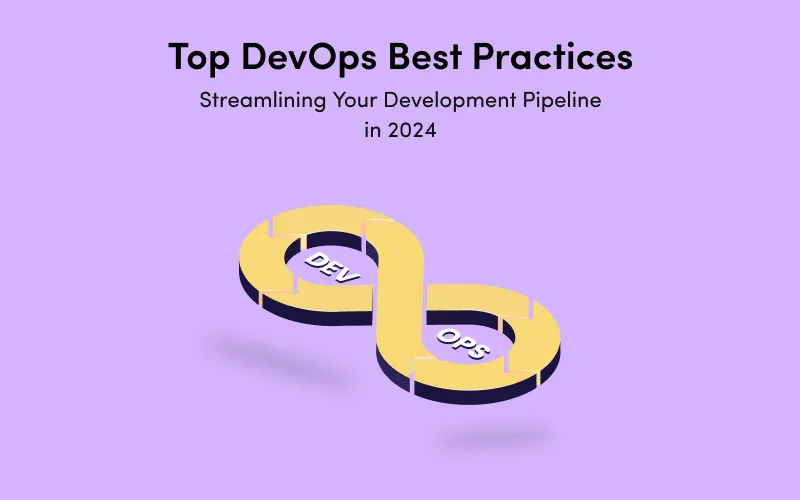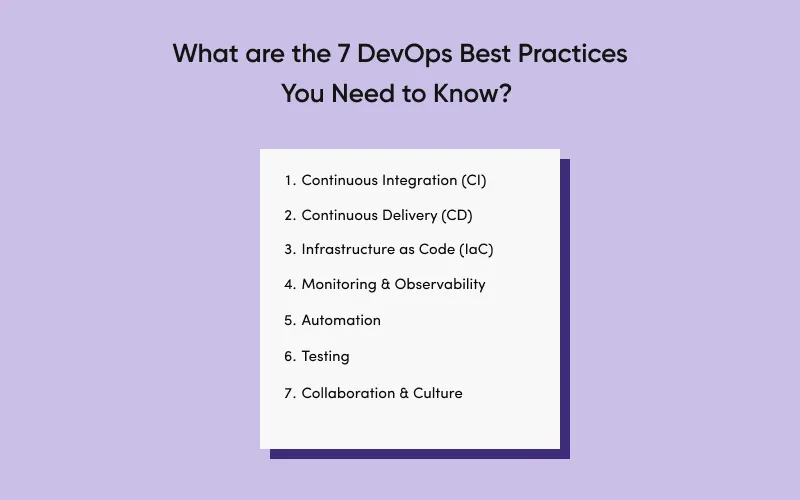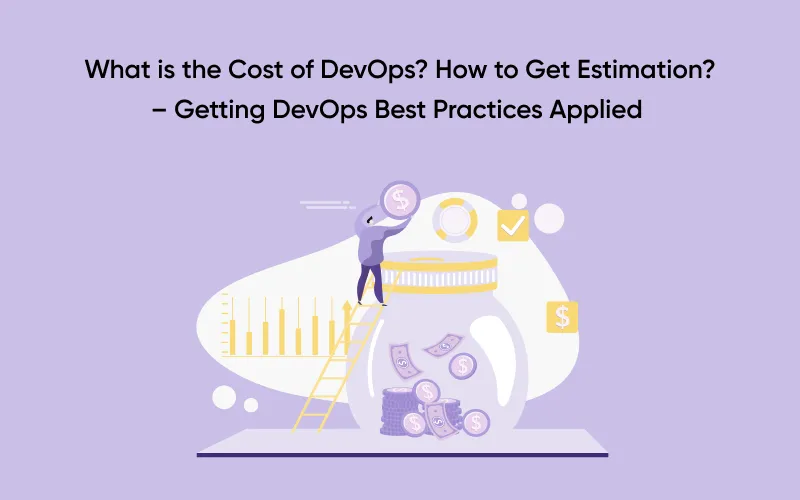Technology


5 min


Unlock unparalleled agility and efficiency with our comprehensive guide to DevOps best practices in 2024. Streamline your development pipeline and stay ahead in today's DevOps trends in 2024 with Quokka Labs.

By Dhruv Joshi
22 Feb, 2024
Are you tired of slow deployments, clunky collaboration, and frustrated stakeholders? In today's time, DevOps best practices are no longer a luxury but a necessity for businesses to thrive. DevOps unlocks unparalleled agility, efficiency, and innovation by bridging the gap between development and operations.
But where do you start? How do you navigate the ever-evolving landscape of DevOps trends? This blog is your one-stop guide to streamlining your development pipeline and unlocking the business benefits of DevOps in 2024.
Wait wait!
As per current DevOps trends in 2024, high-performing DevOps teams deploy 30 times more frequently and have 2 times faster lead times than low-performing teams. Partner with Quokka Labs and harness the power of DevOps Best Practices to revolutionize your software delivery.
Now, let's look a little bit more deeply into DevOps!
DevOps. You've heard the term thrown around, seen it plastered on conference banners, and maybe even received a friendly nudge to "implement DevOps" within your organization. But what exactly does it mean? Is it another trendy buzzword, or is something transformative lurking beneath the surface?
The truth is that DevOps is much more than just a catchy phrase. It's a cultural shift, a philosophical revolution in how software is built and delivered. It's about tearing down the walls between development and operations, fostering collaboration and shared responsibility.
Imagine a world where developers aren't siloed away from the production environment, operations teams aren't solely focused on firefighting, and both sides work together seamlessly to deliver high-quality software at lightning speed. That's the DevOps dream, and it's not just a fantasy – it's a reality achievable for any organization willing to grab the change.
But why should you care?
What are the real benefits of DevOps best practices and beyond the hype? Here are just a few:
Faster Time to Market: Streamlined processes and automation mean you can get your products and features into the hands of users quicker, giving you a competitive edge in DevOps trends in 2024.
Improved Quality: Continuous integration and testing catches bugs early and often, leading to more reliable and stable software.
Enhanced Collaboration: Breaking down silos fosters communication and understanding between teams, leading to a more positive and productive work environment.
Increased Innovation: With less tedious work, developers and operations teams can focus on creative problem-solving and pushing the boundaries.
Reduced Costs: Automation and efficiency eliminate manual work, leading to lower operational costs and improved resource utilization.
Ready to take the plunge? Stay tuned for the next section, where we'll explore the seven core practices that form the foundation of a successful DevOps strategy.
 Under the DevOps trends in 2024, think of your development pipeline as a complex orchestra where developers, testers, and operations teams play their individual instruments. Without collaboration and harmony, the resulting music can be disjointed and unpleasant.
Under the DevOps trends in 2024, think of your development pipeline as a complex orchestra where developers, testers, and operations teams play their individual instruments. Without collaboration and harmony, the resulting music can be disjointed and unpleasant.
DevOps best practices are the sheet music that brings these diverse groups together, ensuring a smooth, beautiful software delivery flow.
Now, imagine conducting this orchestra with seven powerful tools at your disposal. These are the seven essential DevOps practices you need to know:
Picture frequent code commits from developers, each triggering automated builds and tests. CI acts like a vigilant tuning fork, identifying potential issues early and preventing discordant notes.
Now that your code is in tune, the CD automates the deployment process, ensuring each iteration seamlessly reaches the production stage. Think of it as the conductor coordinating instrument transitions, bringing the music to life.
Forget handwritten sheet music prone to errors. IaC treats infrastructure like code, ensuring consistent and repeatable deployments across environments. It's like having a digital blueprint for your infrastructure, eliminating unexpected notes, and ensuring everyone plays from the same score.
Just like the conductor listens intently to the orchestra, effective monitoring keeps a watchful eye on system health and performance. Logs, metrics, and tracing tools provide deep insights, letting you identify and address issues before they disrupt the flow.
Repetitive tasks like manual configurations and deployments can bog down your orchestra. Automation is your maestro; automating these tasks frees up team members for more strategic work. Imagine the conductor delegating repetitive tasks to assistants, allowing them to focus on the overall performance.
Comprehensive testing is crucial for ensuring the harmony of your software. DevOps promotes both automated and manual testing throughout the pipeline, guaranteeing each instrument plays its part flawlessly. It's like having a dedicated quality control team refining the sound, ensuring perfect execution.
Remember, it's not just about tools and techniques. DevOps best practices foster a culture of shared responsibility, open communication, and continuous learning. It breaks down silos between teams, creating a collaborative setting where everyone works together to achieve the perfect symphony. Imagine the orchestra members communicating seamlessly, each section supporting the others to create a unified sound.
The DevOps landscape is constantly evolving, driven by technological advancements, industry trends, and ever-changing business needs. While the core principles of collaboration, automation, and continuous improvement remain constant, 2024 promises exciting new chapters in the DevOps story.
Here's a glimpse into what lies ahead:
Automation will approach and level up by integrating Artificial Intelligence (AI) and Machine Learning (ML) services. Imagine intelligent tools that autonomously optimize deployments, predict potential issues, and suggest code improvements. These "DevOps bots" will free up human teams for higher-level decision-making and strategic planning.
With rising cyber threats, security will become an even more embedded aspect of the DevOps pipeline. Security-focused tools and practices like DevSecOps will be essential for safeguarding software throughout its lifecycle, from design to deployment. Think of it as building a security fortress around your development process, ensuring every brick is well-secured.
Developers are the heart and soul of software creation. In 2024, the focus will shift towards crafting seamless and empowering developer experiences. User-friendly tools, streamlined workflows, and AI-powered assistance will enable developers to work faster, smarter, and more creatively. Imagine giving every developer a magic wand that simplifies complex tasks and fuels innovation.
Cloud-based infrastructure and tools will continue their ascent, offering scalability, flexibility, and agility. Serverless computing, microservices architectures, and containerization will become commonplace, further accelerating software development and deployment cycles. Think of it as building your development environment on a cloud trampoline, bouncing effortlessly between tasks and scaling on demand.
As DevOps continues to evolve, so must the individuals and teams driving it. Continuous learning will be paramount, with organizations embracing training programs, knowledge-sharing platforms, and open-source collaboration to stay ahead of the curve. Imagine a DevOps community orchestra where members constantly refine their skills and share their knowledge to create an ever-evolving masterpiece.
So, you've heard the buzz about DevOps best practices, read about DevOps trends in 2024, and even contemplated hiring a DevOps developer from Quokka Labs. But let's face it, the real question lingers: Is DevOps actually worth the investment?
Spoiler alert: The answer is a resounding YES! But rather than blind faith, let's crunch some numbers and reveal the tangible Business Benefits of DevOps that translate into a solid ROI.
Imagine this: Your current development pipeline is slow, riddled with bottlenecks, and prone to errors.
It translates to:
Now, picture this: With DevOps consulting services, you implement DevOps best practices like:
The Result?
The math becomes clear:
These are just a few examples. The true ROI of DevOps depends on your specific context, but studies show an average increase in software delivery speed of 40% and a 20% improvement in operational efficiency.
Still not convinced? Partner with Quokka Labs for a free DevOps assessment. We'll analyze your current processes, identify potential bottlenecks, and calculate the projected ROI of implementing DevOps best practices.
 Ah, the age-old question: how much does DevOps actually cost?
Ah, the age-old question: how much does DevOps actually cost?
The cost of DevOps is as unique as your fingerprint (and probably more interesting). Several factors influence the price tag, so let's unpack them.
Are you a DevOps newbie or a seasoned pro? Starting from scratch will naturally cost more than optimizing existing processes. New foundations require more effort than renovations.
What are you aiming to achieve? Streamlining deployments? Boosting quality? Each goal carries different costs. Imagine climbing a mountain; reaching the peak (full DevOps transformation) requires more resources than reaching base camp (simple improvements).
Do you have a dedicated DevOps team or need external help? In-house expertise can save costs initially, but hiring and training require investment. Outsourcing to consultants offers faster implementation but comes with its own fee.
Fancy cloud platforms and cutting-edge tools can be amazing but often incur subscription fees or licensing costs. Remember, even the shiniest tools need the right hands to wield them effectively.
Big bang or gradual rollout? The "rip and replace" approach might be quicker but can be disruptive and expensive. Gradual adoption allows for learning and adjustments, potentially saving costs in the long run.
Now, the million-dollar question: what are the actual numbers? Buckle up, because it's more of a range than a fixed price:
Quokka Labs DevOps Cost:
Want to know the exact DevOps price? Let's connect today and consult for free!
Don't go it alone! Partnering with a trusted DevOps consulting services provider, like Quokka Labs can accelerate your journey and ensure success. If you want to hire DevOps developer, why not us? Our team of expert DevOps developers can help you:
DevOps is suitable for you if you want to achieve faster deployments, improved software quality, and increased business agility.
The timeframe varies depending on your organization's size and complexity. However, you can get results within weeks or months with the proper guidance and support.
Costs vary depending on your specific needs and project scope. However, the ROI of a successful DevOps implementation far outweighs the initial investment.
Automation: Automate repetitive tasks like building, testing, and deployment with CI/CD tools (e.g., Jenkins, GitLab CI/CD) and infrastructure as code (IaC) tools (e.g., Terraform, Ansible).
Optimize Continuous Integration (CI): Implement unit and integration tests early in the pipeline to catch bugs quickly. Use containerization (e.g., Docker) for consistent environments.
Continuous Delivery (CD) Made Easy: Leverage feature flags and blue-green deployments for safe and controlled rollouts. Automate infrastructure provisioning and configuration management.
Monitoring and Feedback: Employ real-time monitoring tools to track performance and identify issues proactively. Encourage feedback loops between development and operations.
Invest in Skills & Training: Upskill your team with the latest DevOps tools and methodologies. Make a culture of collab and continuous learning.
The best DevOps best practices are:
Here are seven best practices of DevOps:
In 2024, USA startups should prioritize DevOps best practices such as automation, cloud-native architecture, DevSecOps, CI/CD pipelines, collaborative culture, monitoring and feedback loops, developer experience, agile and lean methodologies, cross-functional teams, and continuous learning. These practices enable startups to streamline processes, enhance security, accelerate releases, foster innovation, and adapt quickly to market demands, ultimately driving success in the dynamic tech landscape.
In 2024, streamline the software development lifecycle by embracing automation, integrating DevSecOps practices, implementing CI/CD pipelines, fostering collaboration, and prioritizing continuous learning and improvement.
Take the first step towards a streamlined development pipeline and future-proof your business. Contact Quokka Labs today and unlock the power of DevOps in 2024 and beyond!
What Is an API? A Developer's Guide to Application Integration in 2025
By Dhruv Joshi
5 min read
What Is a Push Notification and Why It Matters for Your App Strategy
By Dhruv Joshi
5 min read
Top React Native Development Companies to Build Scalable Apps
By Dhruv Joshi
5 min read
How Wearable Technology Is Driving Real-Time Data Experiences in Mobile Apps
By Sannidhya Sharma
5 min read

Technology


5 min
What is an API? Learn the real meaning of Application Programming Interfaces in 2025, how APIs work, why they're essential to software development, and how to integrate them. This developer-focused guide breaks down API types, use cases, benefits, and best practices for business success.


Technology


5 min
Wearable technology is reshaping mobile apps with real-time insights, enabling smart alerts, fitness coaching, health monitoring, and more. From smart rings to AR glasses, explore how these evolving devices are creating seamless, personalized experiences across various industries and everyday life.


Technology


5 min
Augmented reality in retail helps brands drive sales and reduce returns by transforming how customers discover, try, and buy products. This blog is your guide to using AR strategically, from choosing the right use cases to launching cost-effective AR experiences that delight customers and differentiate your brand.


Feeling lost!! Book a slot and get answers to all your industry-relevant doubts